Nursing Philosophy and Standards Report - UTS Nursing Program
VerifiedAdded on 2022/10/15
|7
|1264
|13
Report
AI Summary
This report examines the nursing philosophy and standards, focusing on the role of nurses in delivering quality patient care. It references key guidelines from the University of Technology Sydney (UTS) and the Nursing and Midwifery Board of Australia (NMBA), emphasizing professionalism, ethical frameworks, cultural sensitivity, and effective communication. The report outlines professional and therapeutic nursing standards, including adherence to legislation, ethical decision-making, and patient advocacy. It highlights the importance of respecting patient rights, maintaining therapeutic relationships, and collaborating with colleagues. The report also references several studies and publications that support evidence-based practice and therapeutic interventions in nursing, such as the Nursing Interventions Classification (NIC) and complementary therapies, concluding with the author's confidence in applying these standards during clinical placement.
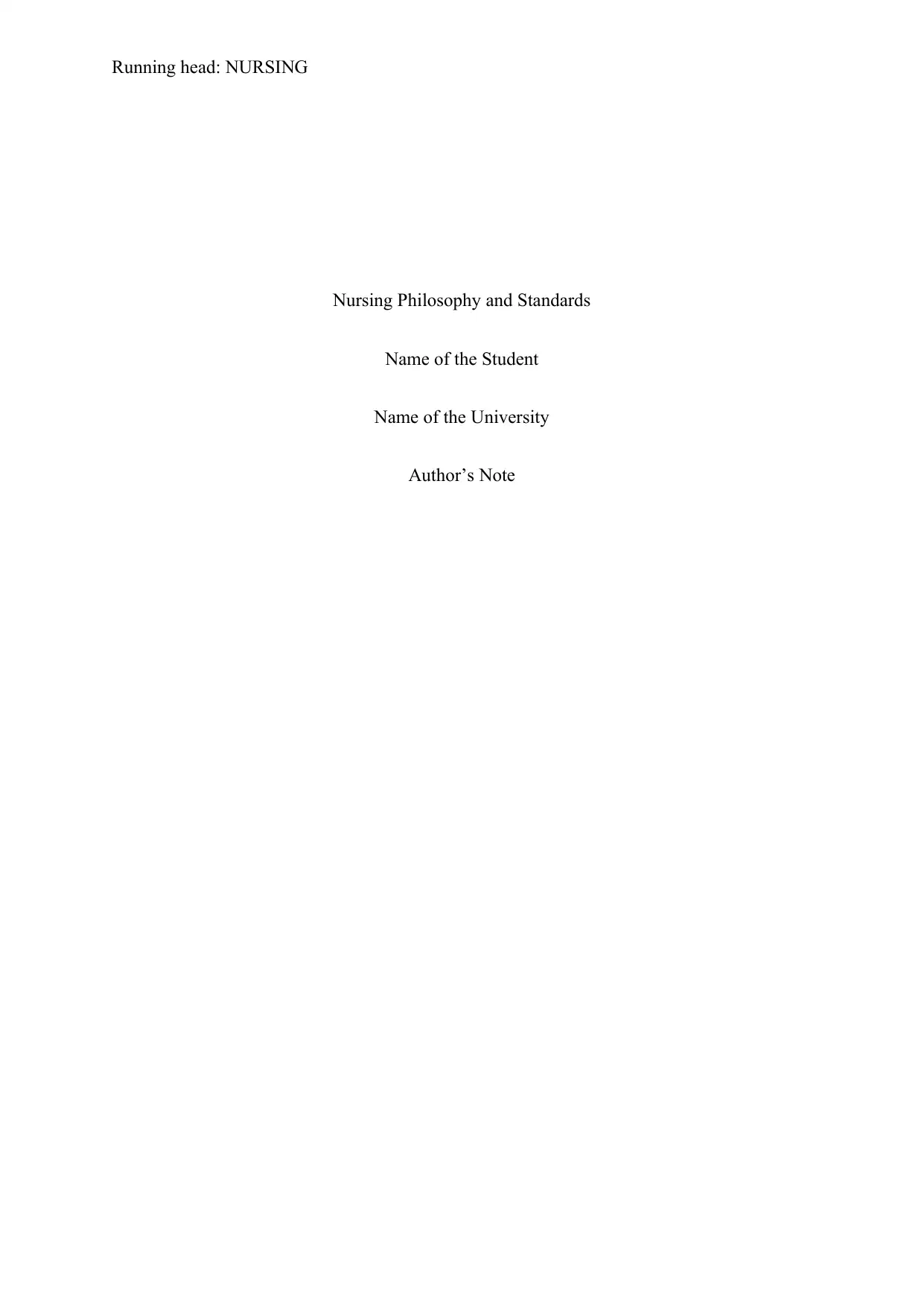
Running head: NURSING
Nursing Philosophy and Standards
Name of the Student
Name of the University
Author’s Note
Nursing Philosophy and Standards
Name of the Student
Name of the University
Author’s Note
Paraphrase This Document
Need a fresh take? Get an instant paraphrase of this document with our AI Paraphraser
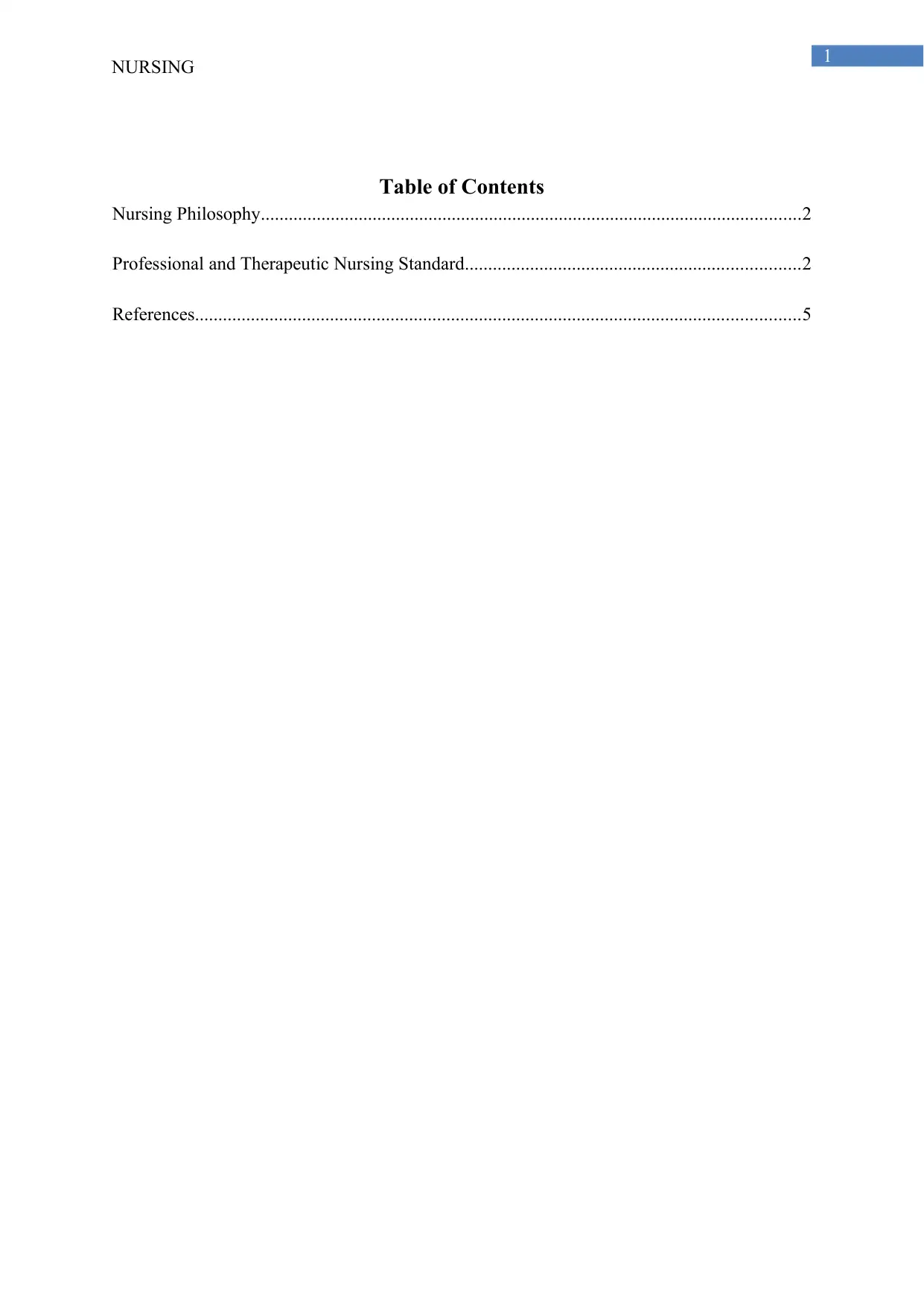
1
NURSING
Table of Contents
Nursing Philosophy....................................................................................................................2
Professional and Therapeutic Nursing Standard........................................................................2
References..................................................................................................................................5
NURSING
Table of Contents
Nursing Philosophy....................................................................................................................2
Professional and Therapeutic Nursing Standard........................................................................2
References..................................................................................................................................5
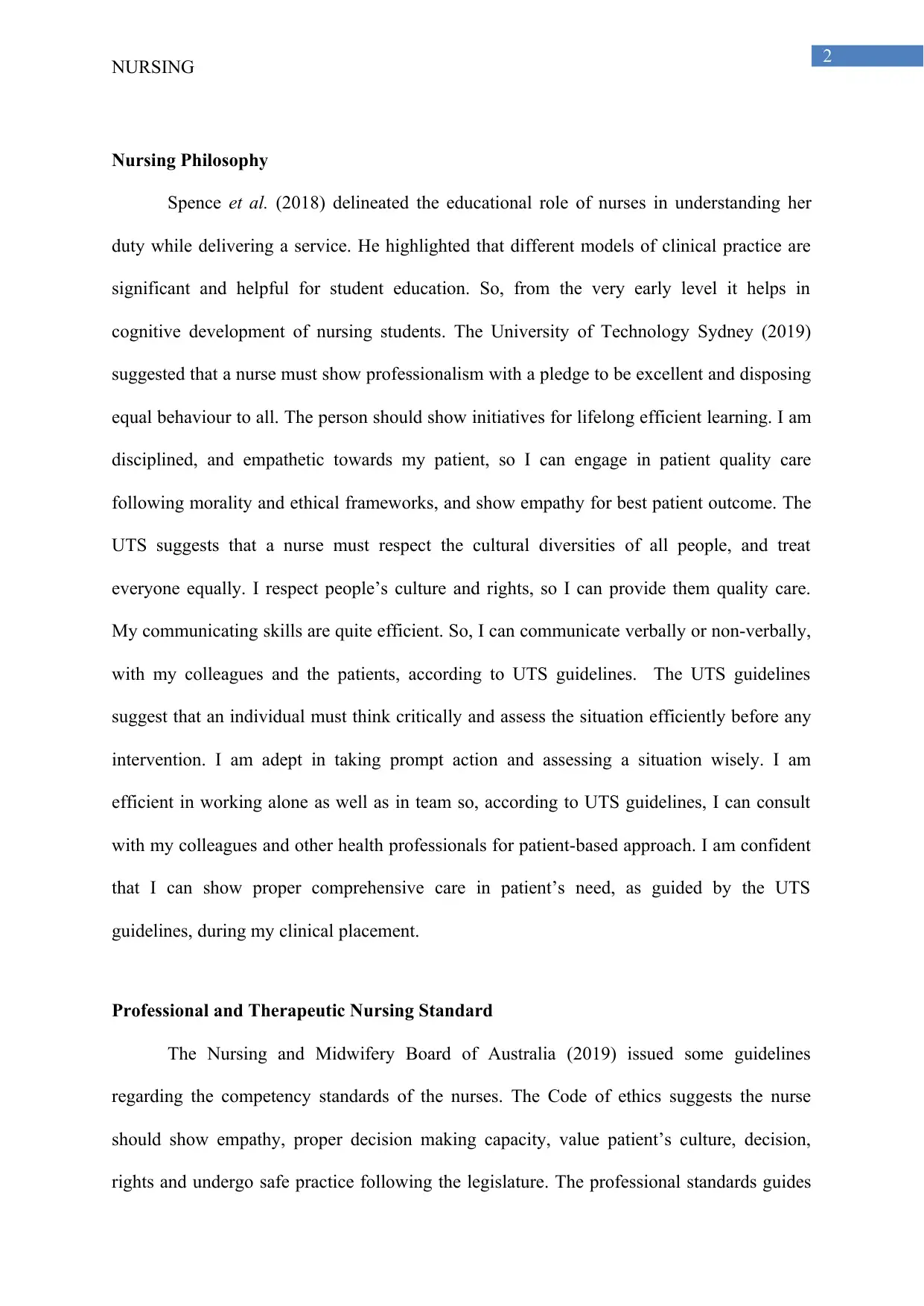
2
NURSING
Nursing Philosophy
Spence et al. (2018) delineated the educational role of nurses in understanding her
duty while delivering a service. He highlighted that different models of clinical practice are
significant and helpful for student education. So, from the very early level it helps in
cognitive development of nursing students. The University of Technology Sydney (2019)
suggested that a nurse must show professionalism with a pledge to be excellent and disposing
equal behaviour to all. The person should show initiatives for lifelong efficient learning. I am
disciplined, and empathetic towards my patient, so I can engage in patient quality care
following morality and ethical frameworks, and show empathy for best patient outcome. The
UTS suggests that a nurse must respect the cultural diversities of all people, and treat
everyone equally. I respect people’s culture and rights, so I can provide them quality care.
My communicating skills are quite efficient. So, I can communicate verbally or non-verbally,
with my colleagues and the patients, according to UTS guidelines. The UTS guidelines
suggest that an individual must think critically and assess the situation efficiently before any
intervention. I am adept in taking prompt action and assessing a situation wisely. I am
efficient in working alone as well as in team so, according to UTS guidelines, I can consult
with my colleagues and other health professionals for patient-based approach. I am confident
that I can show proper comprehensive care in patient’s need, as guided by the UTS
guidelines, during my clinical placement.
Professional and Therapeutic Nursing Standard
The Nursing and Midwifery Board of Australia (2019) issued some guidelines
regarding the competency standards of the nurses. The Code of ethics suggests the nurse
should show empathy, proper decision making capacity, value patient’s culture, decision,
rights and undergo safe practice following the legislature. The professional standards guides
NURSING
Nursing Philosophy
Spence et al. (2018) delineated the educational role of nurses in understanding her
duty while delivering a service. He highlighted that different models of clinical practice are
significant and helpful for student education. So, from the very early level it helps in
cognitive development of nursing students. The University of Technology Sydney (2019)
suggested that a nurse must show professionalism with a pledge to be excellent and disposing
equal behaviour to all. The person should show initiatives for lifelong efficient learning. I am
disciplined, and empathetic towards my patient, so I can engage in patient quality care
following morality and ethical frameworks, and show empathy for best patient outcome. The
UTS suggests that a nurse must respect the cultural diversities of all people, and treat
everyone equally. I respect people’s culture and rights, so I can provide them quality care.
My communicating skills are quite efficient. So, I can communicate verbally or non-verbally,
with my colleagues and the patients, according to UTS guidelines. The UTS guidelines
suggest that an individual must think critically and assess the situation efficiently before any
intervention. I am adept in taking prompt action and assessing a situation wisely. I am
efficient in working alone as well as in team so, according to UTS guidelines, I can consult
with my colleagues and other health professionals for patient-based approach. I am confident
that I can show proper comprehensive care in patient’s need, as guided by the UTS
guidelines, during my clinical placement.
Professional and Therapeutic Nursing Standard
The Nursing and Midwifery Board of Australia (2019) issued some guidelines
regarding the competency standards of the nurses. The Code of ethics suggests the nurse
should show empathy, proper decision making capacity, value patient’s culture, decision,
rights and undergo safe practice following the legislature. The professional standards guides
⊘ This is a preview!⊘
Do you want full access?
Subscribe today to unlock all pages.

Trusted by 1+ million students worldwide
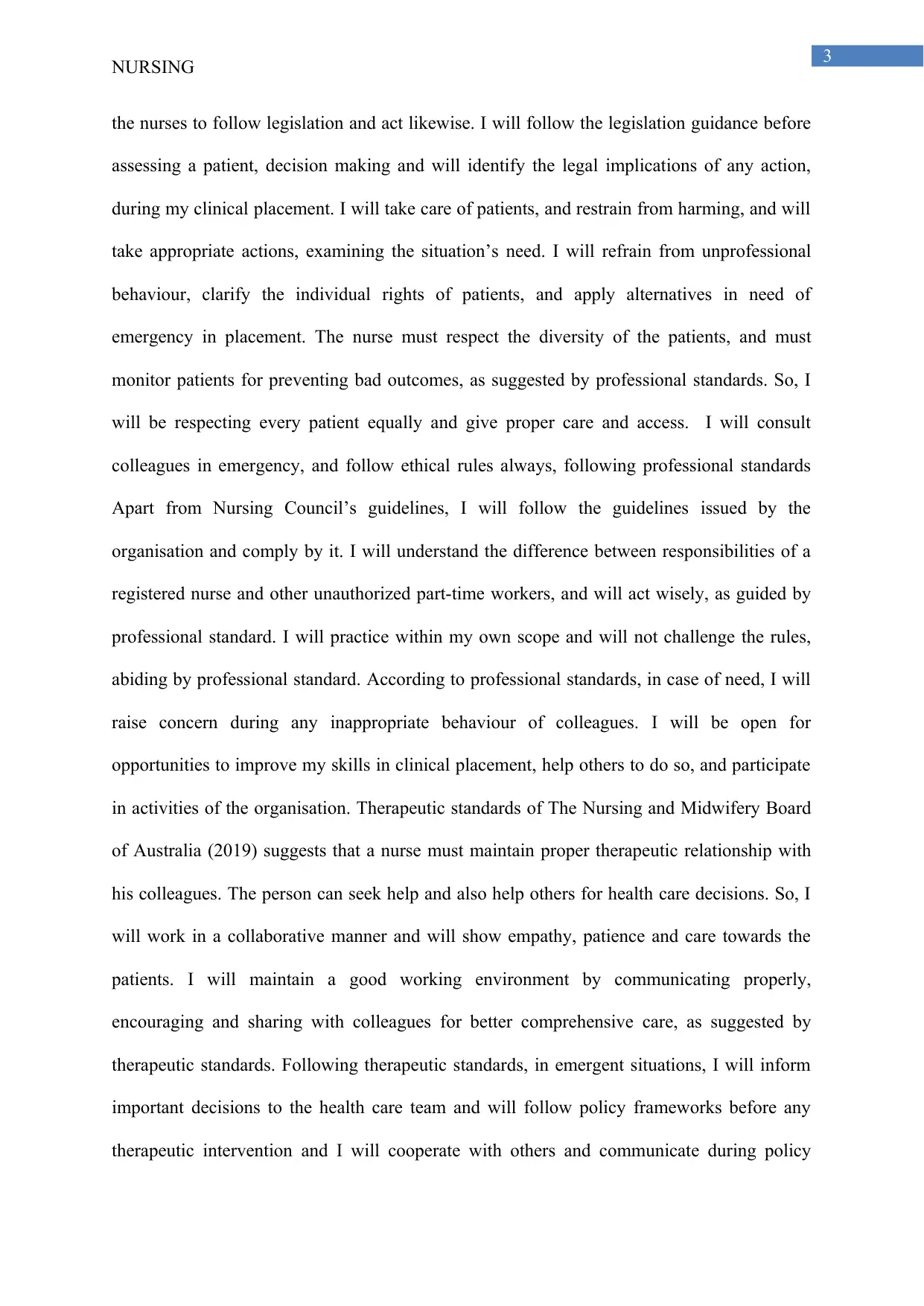
3
NURSING
the nurses to follow legislation and act likewise. I will follow the legislation guidance before
assessing a patient, decision making and will identify the legal implications of any action,
during my clinical placement. I will take care of patients, and restrain from harming, and will
take appropriate actions, examining the situation’s need. I will refrain from unprofessional
behaviour, clarify the individual rights of patients, and apply alternatives in need of
emergency in placement. The nurse must respect the diversity of the patients, and must
monitor patients for preventing bad outcomes, as suggested by professional standards. So, I
will be respecting every patient equally and give proper care and access. I will consult
colleagues in emergency, and follow ethical rules always, following professional standards
Apart from Nursing Council’s guidelines, I will follow the guidelines issued by the
organisation and comply by it. I will understand the difference between responsibilities of a
registered nurse and other unauthorized part-time workers, and will act wisely, as guided by
professional standard. I will practice within my own scope and will not challenge the rules,
abiding by professional standard. According to professional standards, in case of need, I will
raise concern during any inappropriate behaviour of colleagues. I will be open for
opportunities to improve my skills in clinical placement, help others to do so, and participate
in activities of the organisation. Therapeutic standards of The Nursing and Midwifery Board
of Australia (2019) suggests that a nurse must maintain proper therapeutic relationship with
his colleagues. The person can seek help and also help others for health care decisions. So, I
will work in a collaborative manner and will show empathy, patience and care towards the
patients. I will maintain a good working environment by communicating properly,
encouraging and sharing with colleagues for better comprehensive care, as suggested by
therapeutic standards. Following therapeutic standards, in emergent situations, I will inform
important decisions to the health care team and will follow policy frameworks before any
therapeutic intervention and I will cooperate with others and communicate during policy
NURSING
the nurses to follow legislation and act likewise. I will follow the legislation guidance before
assessing a patient, decision making and will identify the legal implications of any action,
during my clinical placement. I will take care of patients, and restrain from harming, and will
take appropriate actions, examining the situation’s need. I will refrain from unprofessional
behaviour, clarify the individual rights of patients, and apply alternatives in need of
emergency in placement. The nurse must respect the diversity of the patients, and must
monitor patients for preventing bad outcomes, as suggested by professional standards. So, I
will be respecting every patient equally and give proper care and access. I will consult
colleagues in emergency, and follow ethical rules always, following professional standards
Apart from Nursing Council’s guidelines, I will follow the guidelines issued by the
organisation and comply by it. I will understand the difference between responsibilities of a
registered nurse and other unauthorized part-time workers, and will act wisely, as guided by
professional standard. I will practice within my own scope and will not challenge the rules,
abiding by professional standard. According to professional standards, in case of need, I will
raise concern during any inappropriate behaviour of colleagues. I will be open for
opportunities to improve my skills in clinical placement, help others to do so, and participate
in activities of the organisation. Therapeutic standards of The Nursing and Midwifery Board
of Australia (2019) suggests that a nurse must maintain proper therapeutic relationship with
his colleagues. The person can seek help and also help others for health care decisions. So, I
will work in a collaborative manner and will show empathy, patience and care towards the
patients. I will maintain a good working environment by communicating properly,
encouraging and sharing with colleagues for better comprehensive care, as suggested by
therapeutic standards. Following therapeutic standards, in emergent situations, I will inform
important decisions to the health care team and will follow policy frameworks before any
therapeutic intervention and I will cooperate with others and communicate during policy
Paraphrase This Document
Need a fresh take? Get an instant paraphrase of this document with our AI Paraphraser
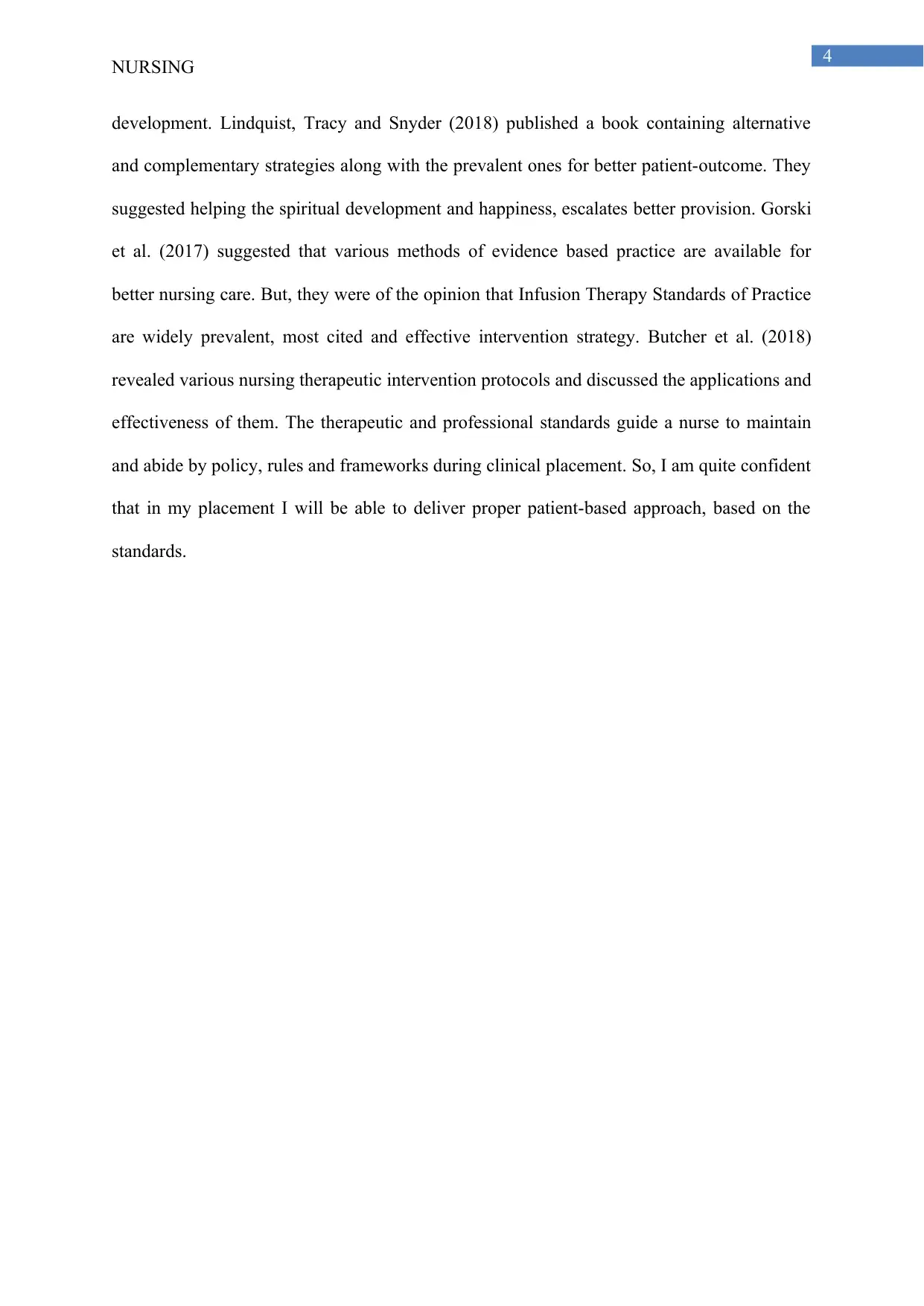
4
NURSING
development. Lindquist, Tracy and Snyder (2018) published a book containing alternative
and complementary strategies along with the prevalent ones for better patient-outcome. They
suggested helping the spiritual development and happiness, escalates better provision. Gorski
et al. (2017) suggested that various methods of evidence based practice are available for
better nursing care. But, they were of the opinion that Infusion Therapy Standards of Practice
are widely prevalent, most cited and effective intervention strategy. Butcher et al. (2018)
revealed various nursing therapeutic intervention protocols and discussed the applications and
effectiveness of them. The therapeutic and professional standards guide a nurse to maintain
and abide by policy, rules and frameworks during clinical placement. So, I am quite confident
that in my placement I will be able to deliver proper patient-based approach, based on the
standards.
NURSING
development. Lindquist, Tracy and Snyder (2018) published a book containing alternative
and complementary strategies along with the prevalent ones for better patient-outcome. They
suggested helping the spiritual development and happiness, escalates better provision. Gorski
et al. (2017) suggested that various methods of evidence based practice are available for
better nursing care. But, they were of the opinion that Infusion Therapy Standards of Practice
are widely prevalent, most cited and effective intervention strategy. Butcher et al. (2018)
revealed various nursing therapeutic intervention protocols and discussed the applications and
effectiveness of them. The therapeutic and professional standards guide a nurse to maintain
and abide by policy, rules and frameworks during clinical placement. So, I am quite confident
that in my placement I will be able to deliver proper patient-based approach, based on the
standards.
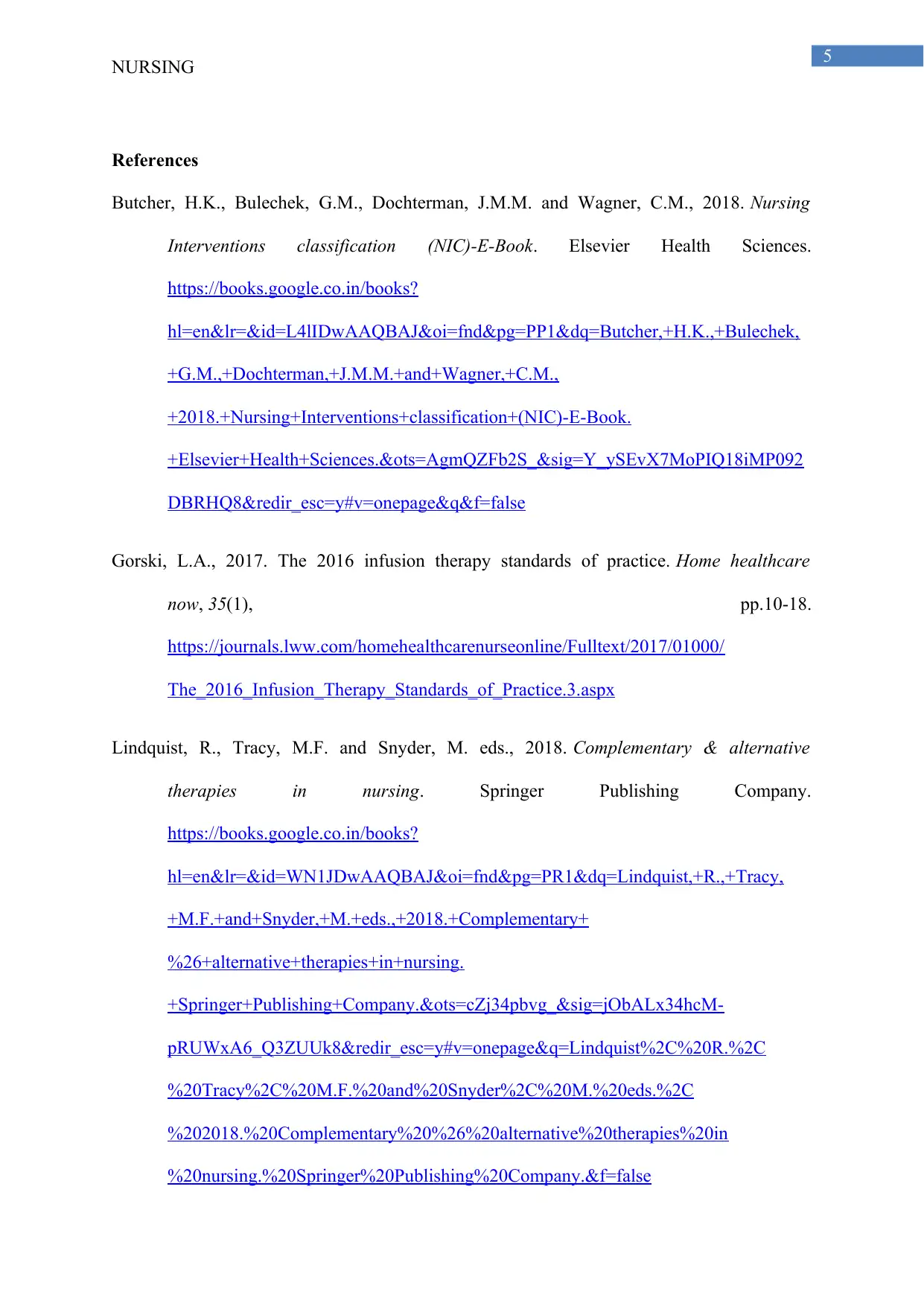
5
NURSING
References
Butcher, H.K., Bulechek, G.M., Dochterman, J.M.M. and Wagner, C.M., 2018. Nursing
Interventions classification (NIC)-E-Book. Elsevier Health Sciences.
https://books.google.co.in/books?
hl=en&lr=&id=L4lIDwAAQBAJ&oi=fnd&pg=PP1&dq=Butcher,+H.K.,+Bulechek,
+G.M.,+Dochterman,+J.M.M.+and+Wagner,+C.M.,
+2018.+Nursing+Interventions+classification+(NIC)-E-Book.
+Elsevier+Health+Sciences.&ots=AgmQZFb2S_&sig=Y_ySEvX7MoPIQ18iMP092
DBRHQ8&redir_esc=y#v=onepage&q&f=false
Gorski, L.A., 2017. The 2016 infusion therapy standards of practice. Home healthcare
now, 35(1), pp.10-18.
https://journals.lww.com/homehealthcarenurseonline/Fulltext/2017/01000/
The_2016_Infusion_Therapy_Standards_of_Practice.3.aspx
Lindquist, R., Tracy, M.F. and Snyder, M. eds., 2018. Complementary & alternative
therapies in nursing. Springer Publishing Company.
https://books.google.co.in/books?
hl=en&lr=&id=WN1JDwAAQBAJ&oi=fnd&pg=PR1&dq=Lindquist,+R.,+Tracy,
+M.F.+and+Snyder,+M.+eds.,+2018.+Complementary+
%26+alternative+therapies+in+nursing.
+Springer+Publishing+Company.&ots=cZj34pbvg_&sig=jObALx34hcM-
pRUWxA6_Q3ZUUk8&redir_esc=y#v=onepage&q=Lindquist%2C%20R.%2C
%20Tracy%2C%20M.F.%20and%20Snyder%2C%20M.%20eds.%2C
%202018.%20Complementary%20%26%20alternative%20therapies%20in
%20nursing.%20Springer%20Publishing%20Company.&f=false
NURSING
References
Butcher, H.K., Bulechek, G.M., Dochterman, J.M.M. and Wagner, C.M., 2018. Nursing
Interventions classification (NIC)-E-Book. Elsevier Health Sciences.
https://books.google.co.in/books?
hl=en&lr=&id=L4lIDwAAQBAJ&oi=fnd&pg=PP1&dq=Butcher,+H.K.,+Bulechek,
+G.M.,+Dochterman,+J.M.M.+and+Wagner,+C.M.,
+2018.+Nursing+Interventions+classification+(NIC)-E-Book.
+Elsevier+Health+Sciences.&ots=AgmQZFb2S_&sig=Y_ySEvX7MoPIQ18iMP092
DBRHQ8&redir_esc=y#v=onepage&q&f=false
Gorski, L.A., 2017. The 2016 infusion therapy standards of practice. Home healthcare
now, 35(1), pp.10-18.
https://journals.lww.com/homehealthcarenurseonline/Fulltext/2017/01000/
The_2016_Infusion_Therapy_Standards_of_Practice.3.aspx
Lindquist, R., Tracy, M.F. and Snyder, M. eds., 2018. Complementary & alternative
therapies in nursing. Springer Publishing Company.
https://books.google.co.in/books?
hl=en&lr=&id=WN1JDwAAQBAJ&oi=fnd&pg=PR1&dq=Lindquist,+R.,+Tracy,
+M.F.+and+Snyder,+M.+eds.,+2018.+Complementary+
%26+alternative+therapies+in+nursing.
+Springer+Publishing+Company.&ots=cZj34pbvg_&sig=jObALx34hcM-
pRUWxA6_Q3ZUUk8&redir_esc=y#v=onepage&q=Lindquist%2C%20R.%2C
%20Tracy%2C%20M.F.%20and%20Snyder%2C%20M.%20eds.%2C
%202018.%20Complementary%20%26%20alternative%20therapies%20in
%20nursing.%20Springer%20Publishing%20Company.&f=false
⊘ This is a preview!⊘
Do you want full access?
Subscribe today to unlock all pages.

Trusted by 1+ million students worldwide
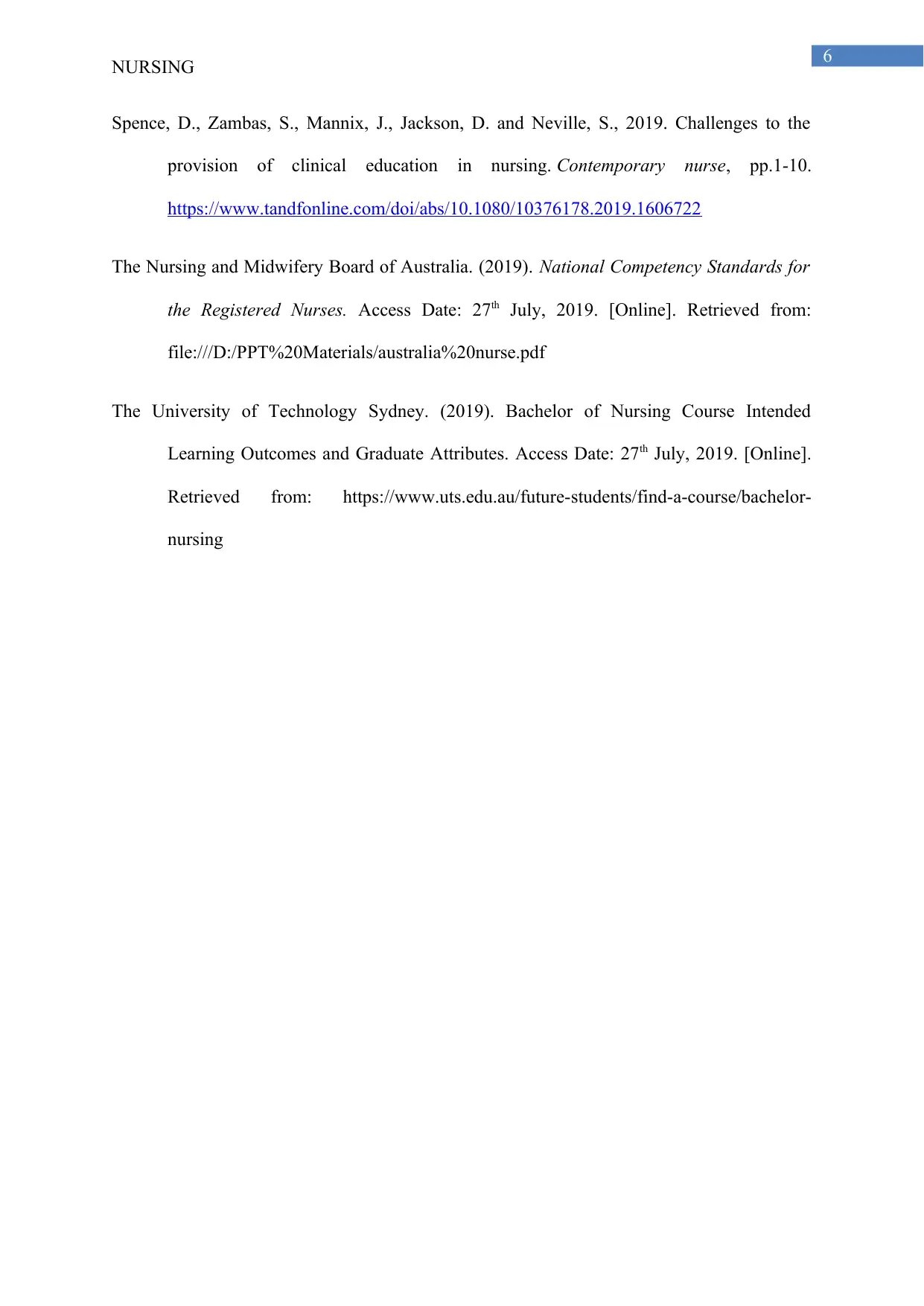
6
NURSING
Spence, D., Zambas, S., Mannix, J., Jackson, D. and Neville, S., 2019. Challenges to the
provision of clinical education in nursing. Contemporary nurse, pp.1-10.
https://www.tandfonline.com/doi/abs/10.1080/10376178.2019.1606722
The Nursing and Midwifery Board of Australia. (2019). National Competency Standards for
the Registered Nurses. Access Date: 27th July, 2019. [Online]. Retrieved from:
file:///D:/PPT%20Materials/australia%20nurse.pdf
The University of Technology Sydney. (2019). Bachelor of Nursing Course Intended
Learning Outcomes and Graduate Attributes. Access Date: 27th July, 2019. [Online].
Retrieved from: https://www.uts.edu.au/future-students/find-a-course/bachelor-
nursing
NURSING
Spence, D., Zambas, S., Mannix, J., Jackson, D. and Neville, S., 2019. Challenges to the
provision of clinical education in nursing. Contemporary nurse, pp.1-10.
https://www.tandfonline.com/doi/abs/10.1080/10376178.2019.1606722
The Nursing and Midwifery Board of Australia. (2019). National Competency Standards for
the Registered Nurses. Access Date: 27th July, 2019. [Online]. Retrieved from:
file:///D:/PPT%20Materials/australia%20nurse.pdf
The University of Technology Sydney. (2019). Bachelor of Nursing Course Intended
Learning Outcomes and Graduate Attributes. Access Date: 27th July, 2019. [Online].
Retrieved from: https://www.uts.edu.au/future-students/find-a-course/bachelor-
nursing
1 out of 7
Related Documents
Your All-in-One AI-Powered Toolkit for Academic Success.
+13062052269
info@desklib.com
Available 24*7 on WhatsApp / Email
![[object Object]](/_next/static/media/star-bottom.7253800d.svg)
Unlock your academic potential
Copyright © 2020–2026 A2Z Services. All Rights Reserved. Developed and managed by ZUCOL.





